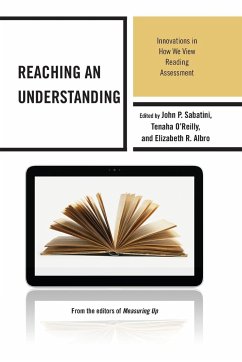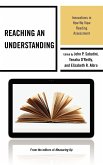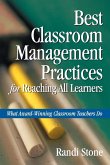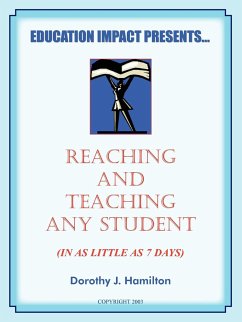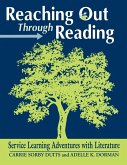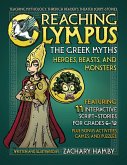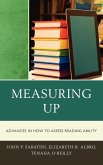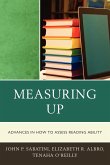John Sabatini, Elizabeth Albro, Tenaha O'Reilly
Reaching an Understanding
Innovations in How We View Reading Assessment
John Sabatini, Elizabeth Albro, Tenaha O'Reilly
Reaching an Understanding
Innovations in How We View Reading Assessment
- Broschiertes Buch
- Merkliste
- Auf die Merkliste
- Bewerten Bewerten
- Teilen
- Produkt teilen
- Produkterinnerung
- Produkterinnerung
Reaching an Understanding: Innovations in How We View Reading Assessment builds upon the editors previous book Measuring Up: Advances in How We Assess Reading Ability by representing some early attempts to apply theory to help guide the development of new assessments and measurement models.
Andere Kunden interessierten sich auch für
![Reaching an Understanding Reaching an Understanding]() John SabatiniReaching an Understanding114,99 €
John SabatiniReaching an Understanding114,99 €![Best Classroom Management Practices for Reaching All Learners Best Classroom Management Practices for Reaching All Learners]() Randi StoneBest Classroom Management Practices for Reaching All Learners29,99 €
Randi StoneBest Classroom Management Practices for Reaching All Learners29,99 €![Reaching And Teaching Any Student (In As Little As 7 Days) Reaching And Teaching Any Student (In As Little As 7 Days)]() Dorothy J. HamiltonReaching And Teaching Any Student (In As Little As 7 Days)15,99 €
Dorothy J. HamiltonReaching And Teaching Any Student (In As Little As 7 Days)15,99 €![Reaching Out Through Reading Reaching Out Through Reading]() Carrie DuitsReaching Out Through Reading32,99 €
Carrie DuitsReaching Out Through Reading32,99 €![Reaching Olympus, the Greek Myths Reaching Olympus, the Greek Myths]() Zachary P. HambyReaching Olympus, the Greek Myths28,99 €
Zachary P. HambyReaching Olympus, the Greek Myths28,99 €![Measuring Up Measuring Up]() John SabatiniMeasuring Up107,99 €
John SabatiniMeasuring Up107,99 €![Measuring Up Measuring Up]() John SabatiniMeasuring Up52,99 €
John SabatiniMeasuring Up52,99 €-
-
-
Reaching an Understanding: Innovations in How We View Reading Assessment builds upon the editors previous book Measuring Up: Advances in How We Assess Reading Ability by representing some early attempts to apply theory to help guide the development of new assessments and measurement models.
Produktdetails
- Produktdetails
- Verlag: R&L Education
- Seitenzahl: 214
- Erscheinungstermin: 14. August 2012
- Englisch
- Abmessung: 229mm x 152mm x 12mm
- Gewicht: 318g
- ISBN-13: 9781475801019
- ISBN-10: 1475801017
- Artikelnr.: 35720404
- Herstellerkennzeichnung
- Libri GmbH
- Europaallee 1
- 36244 Bad Hersfeld
- gpsr@libri.de
- Verlag: R&L Education
- Seitenzahl: 214
- Erscheinungstermin: 14. August 2012
- Englisch
- Abmessung: 229mm x 152mm x 12mm
- Gewicht: 318g
- ISBN-13: 9781475801019
- ISBN-10: 1475801017
- Artikelnr.: 35720404
- Herstellerkennzeichnung
- Libri GmbH
- Europaallee 1
- 36244 Bad Hersfeld
- gpsr@libri.de
John Sabatini is a Senior Research Scientist in the Research & Development Division at Educational Testing Service in Princeton, NJ. His research interests and expertise are in reading literacy development and disabilities, assessment, cognitive psychology, and educational technology. He is the principal investigator of a Department of Education funded grant to develop pre-K -12 comprehension assessments. Tenaha O'Reilly is currently a Research Scientist at Educational Testing Service in Princeton, New Jersey. His research interests include a variety of topics relating to reading comprehension, metacognition, background knowledge and summative assessment. Elizabeth R. Albro, Ph.D, is currently Acting Commissioner of the National Center for Education Research, Institute of Education Sciences, at the U.S. Department of Education. Dr. Albro received her doctorate in Psychology from the University of Chicago, and served on the Child Development and Education faculty at Whittier College, and on the Psychology faculty at Wheaton College, Norton MA. She has spent the past decade overseeing research programs in the areas of reading and writing and cognitive science at the National Center for Education Research.
Section I: Assessment, Learning, and Instruction: Connecting Text, Task,
and Reader/ Learner
1. Assessing Multiple Source Comprehension Through Evidence Centered Design
Kimberly A. Lawless, Susan R. Goldman, Kimberly Gomez, Flori Manning, and
Jason Braasch
2. The Case for Scenario-Based Assessments of Reading Competency
Kathleen M. Sheehan and Tenaha O'Reilly
3. Assessing Comprehension Processes During Reading
Keith Millis and Joseph Magliano
4. Searching for Supplementary Screening Measures to Identify Children at
High Risk for Developing Later Reading Problems
Donald L. Compton, Amy M. Elleman, and Hugh W. Catts
5. Assessment and Instruction Connections: The Impact of Teachers' Access
and Use of Assessment-to-Instruction Software
Carol McDonald Connor, Frederick J. Morrison, Barry Fishman, and
Christopher Schatschneider
6. Multiple Bases for Comprehension Difficulties: The Potential of
Cognitive and Neurobiological Profiling for Validation of Subtypes and
Development of Assessments
Laurie E. Cutting and Hollis S. Scarborough
7. NLP Methods for Supporting Vocabulary Analysis
Paul Deane
Section II: How to Build for the Future
1. An Explanative Modeling Approach to Measurement of Reading Comprehension
Mark Wilson and Stephen Moore
2. Cognitive Psychometric Models as a Tool for Reading Assessment
Engineering
Joanna Gorin and Dubravka Svetina
and Reader/ Learner
1. Assessing Multiple Source Comprehension Through Evidence Centered Design
Kimberly A. Lawless, Susan R. Goldman, Kimberly Gomez, Flori Manning, and
Jason Braasch
2. The Case for Scenario-Based Assessments of Reading Competency
Kathleen M. Sheehan and Tenaha O'Reilly
3. Assessing Comprehension Processes During Reading
Keith Millis and Joseph Magliano
4. Searching for Supplementary Screening Measures to Identify Children at
High Risk for Developing Later Reading Problems
Donald L. Compton, Amy M. Elleman, and Hugh W. Catts
5. Assessment and Instruction Connections: The Impact of Teachers' Access
and Use of Assessment-to-Instruction Software
Carol McDonald Connor, Frederick J. Morrison, Barry Fishman, and
Christopher Schatschneider
6. Multiple Bases for Comprehension Difficulties: The Potential of
Cognitive and Neurobiological Profiling for Validation of Subtypes and
Development of Assessments
Laurie E. Cutting and Hollis S. Scarborough
7. NLP Methods for Supporting Vocabulary Analysis
Paul Deane
Section II: How to Build for the Future
1. An Explanative Modeling Approach to Measurement of Reading Comprehension
Mark Wilson and Stephen Moore
2. Cognitive Psychometric Models as a Tool for Reading Assessment
Engineering
Joanna Gorin and Dubravka Svetina
Section I: Assessment, Learning, and Instruction: Connecting Text, Task,
and Reader/ Learner
1. Assessing Multiple Source Comprehension Through Evidence Centered Design
Kimberly A. Lawless, Susan R. Goldman, Kimberly Gomez, Flori Manning, and
Jason Braasch
2. The Case for Scenario-Based Assessments of Reading Competency
Kathleen M. Sheehan and Tenaha O'Reilly
3. Assessing Comprehension Processes During Reading
Keith Millis and Joseph Magliano
4. Searching for Supplementary Screening Measures to Identify Children at
High Risk for Developing Later Reading Problems
Donald L. Compton, Amy M. Elleman, and Hugh W. Catts
5. Assessment and Instruction Connections: The Impact of Teachers' Access
and Use of Assessment-to-Instruction Software
Carol McDonald Connor, Frederick J. Morrison, Barry Fishman, and
Christopher Schatschneider
6. Multiple Bases for Comprehension Difficulties: The Potential of
Cognitive and Neurobiological Profiling for Validation of Subtypes and
Development of Assessments
Laurie E. Cutting and Hollis S. Scarborough
7. NLP Methods for Supporting Vocabulary Analysis
Paul Deane
Section II: How to Build for the Future
1. An Explanative Modeling Approach to Measurement of Reading Comprehension
Mark Wilson and Stephen Moore
2. Cognitive Psychometric Models as a Tool for Reading Assessment
Engineering
Joanna Gorin and Dubravka Svetina
and Reader/ Learner
1. Assessing Multiple Source Comprehension Through Evidence Centered Design
Kimberly A. Lawless, Susan R. Goldman, Kimberly Gomez, Flori Manning, and
Jason Braasch
2. The Case for Scenario-Based Assessments of Reading Competency
Kathleen M. Sheehan and Tenaha O'Reilly
3. Assessing Comprehension Processes During Reading
Keith Millis and Joseph Magliano
4. Searching for Supplementary Screening Measures to Identify Children at
High Risk for Developing Later Reading Problems
Donald L. Compton, Amy M. Elleman, and Hugh W. Catts
5. Assessment and Instruction Connections: The Impact of Teachers' Access
and Use of Assessment-to-Instruction Software
Carol McDonald Connor, Frederick J. Morrison, Barry Fishman, and
Christopher Schatschneider
6. Multiple Bases for Comprehension Difficulties: The Potential of
Cognitive and Neurobiological Profiling for Validation of Subtypes and
Development of Assessments
Laurie E. Cutting and Hollis S. Scarborough
7. NLP Methods for Supporting Vocabulary Analysis
Paul Deane
Section II: How to Build for the Future
1. An Explanative Modeling Approach to Measurement of Reading Comprehension
Mark Wilson and Stephen Moore
2. Cognitive Psychometric Models as a Tool for Reading Assessment
Engineering
Joanna Gorin and Dubravka Svetina

